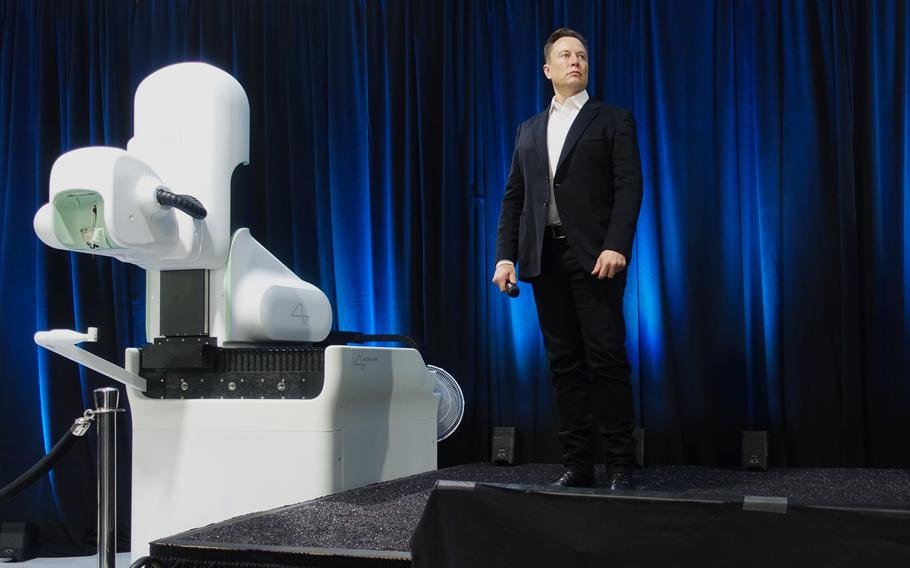
Walter Isaacson’s book, “Elon Musk,” was published Tuesday with the disputed reference intact. It will be corrected in subsequent editions, according to Isaacson and his publisher, Simon & Schuster. Isaacson is the author of best-selling biographies of Albert Einstein and Steve Jobs, among others. (Wikimedia Commons/Jurvetson (flickr))
Walter Isaacson says it was simply a misunderstanding.
In an interview with The Washington Post on Monday, the acclaimed author and journalist said that his new biography of tech billionaire Elon Musk contained a flawed account of Musk’s role in thwarting a Ukrainian military strike on Russia’s naval operations in Crimea last year.
Isaacson’s book, “Elon Musk,” was published Tuesday with the disputed reference intact. It will be corrected in subsequent editions, according to Isaacson and his publisher, Simon & Schuster. Isaacson is the author of best-selling biographies of Albert Einstein and Steve Jobs, among others.
The disputed passage concerns the timing of Musk’s disabling of his Starlink satellite system over Crimea. Musk’s company SpaceX donated Starlink terminals and dishes to the Ukrainian military to replace the communications infrastructure destroyed by Russia’s invasion in early 2022.
Isaacson reports in his book that Musk ordered SpaceX to shut down the Starlink system in Crimea just as the Ukrainian military was about to attack Russian warships with explosives-laden submarine drones. In Isaacson’s initial telling, Musk’s alleged last-minute intervention made it impossible for the Ukrainians to communicate with the drones and complete the attack.
“Throughout the evening and into the night [of the strike], he personally took charge of the situation,” Isaacson writes. “Allowing the use of Starlink for the attack, he concluded, could be a disaster for the world. So he secretly told his engineers to turn off coverage within a hundred kilometers of the Crimean coast. As a result, when the Ukrainian drone subs got near the Russian fleet in Sevastopol, they lost connectivity and washed ashore harmlessly.”
Musk refuted Isaacson’s description following the publication of an excerpt from the book in The Post and a news story about it on CNN.com Thursday.
Musk said that he decided well before the planned strike to disable Starlink within Crimea. He did not specify when he gave the order to “geofence” — or block — the region, but he said it was not in reaction to the drone attack.
Isaacson accepted that explanation, and went on X — the Musk-owned social media platform formerly known as Twitter — to offer a somewhat vague clarification Friday: “The Ukrainians THOUGHT coverage was enabled all the way to Crimea, but it was not. They asked Musk to enable it for their [attack]. Musk did not enable it, because he thought, probably correctly, that would cause a major war.”
Musk followed with his own X post: “At no point did I or anyone at SpaceX promise coverage over Crimea” to the Ukrainians, adding that “our terms of service clearly prohibit Starlink for offensive military action, as we are a civilian system.”
That leaves an open question, however: Why didn’t the Ukrainians know that Starlink was blocked in Crimea when they began planning their drone mission, which was thus doomed to fail? Isaacson indicated that Ukrainian officials were surprised to learn of the Starlink policy on the night of the planned strike and frantically lobbied Musk to reverse it. They were reportedly rebuffed by Musk, who reiterated his policy.
On Monday, in an interview, Isaacson offered further clarification: “I thought he’d instituted that policy [disabling Starlink] that night,” as the drone attack was imminent. “But he was simply reasserting a policy that was already in place” for an unknown amount of time.
The Post appended a correction to its excerpt after hearing from Isaacson. CNN also clarified its original news story on Monday; it declined further comment.
Although the timeline discrepancy undercuts some of the book’s dramatic retelling of the unsuccessful Ukrainian drone strike, Isaacson noted in an interview that it doesn’t change an essential fact: that Musk, a sometimes erratic businessman and private citizen with a penchant for conspiracy theories, has played a critical and even unprecedented role in an international conflict, shaping it in a way no mere tech baron could.
While he claims that the system is civilian, Musk’s ownership of SpaceX essentially gave him veto power over Ukraine’s drone strike and other potential military operations.
Isaacson writes that Musk opposed Ukraine’s planned strike after he spoke with the Russian ambassador to the United States — essentially conferring quasi-diplomatic status on Musk. “The ambassador had explicitly told him that a Ukrainian attack on Crimea would lead to a nuclear response,” Isaacson writes. This foreclosed any thought Musk may have had about enabling Starlink in Crimea.
The Ukrainians also appealed to Musk. When the Ukrainian military learned that Starlink was blocked, Isaacson writes that Musk got “frantic calls and texts” from Ukrainian officials asking him to turn the coverage on.
Musk also discussed the situation with Jake Sullivan, President Biden’s national security adviser, and the chairman of the Joint Chiefs of Staff, Gen. Mark A. Milley, according to Isaacson.
A few weeks later, in October, Musk proposed his own peace plan on Twitter. He suggested holding new referendums in the Russian-occupied Donbas region of eastern Ukraine and giving Russia permanent control of Crimea, which Russia seized from Ukraine in 2014.
Outraged by Musk’s audacity, Ukrainian officials rejected the plan. Will Oremus contributed to this report.